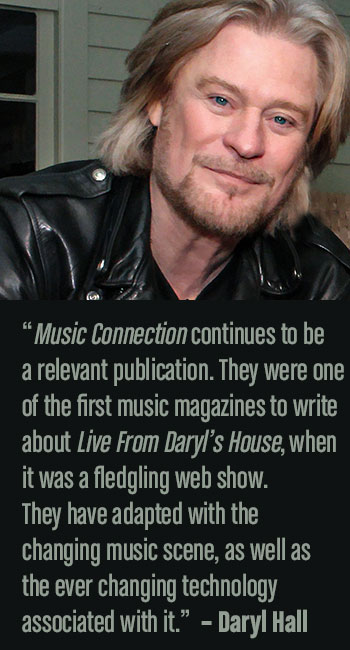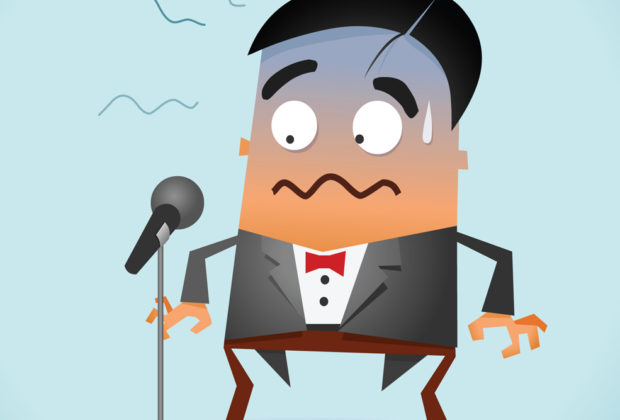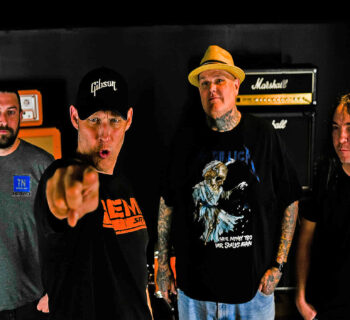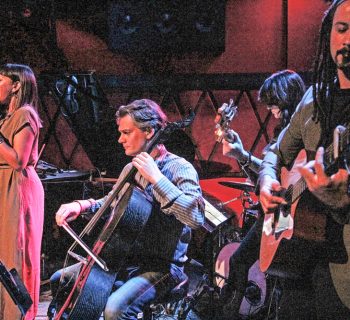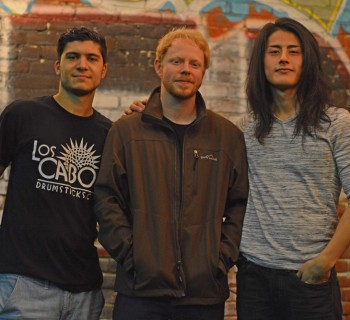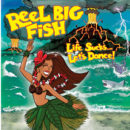This is one of the biggest obstacles that nearly all performers face. It can be a paralyzing fear that can keep you from ever walking onstage and experiencing one of life’s greatest joys. Many famous stars have wrestled with stage fright; Elvis, Barbra Streisand and many others. But you can and must beat it. You must learn how to stare it in the face and make it go away.
Stage fright is NOT fear of the stage. It’s not even fear of performance. It’s fear of the unknown, (which we all fear,) and fear of failure.
In my book, Performance Matters, I address this subject in more depth than I can here.
Here I will share some basic causes of stage fright, and some simple tips that we can all use to help get the upper hand and banish this invis- ible monster.
1. Being unprepared or unre- hearsed. If you don’t know your music and your presentation cold––you’re more likely to screw something up. A good reason to be scared.
TIP - Rehearse. A LOT.
(Note the difference between rehearsing and practicing.) Don’t just practice the songs–– rehearse everything; onstage moves, introductions and other patter. Play your set list in order. KNOW YOUR ACT. The more you know, the less is unknown, and the less you have to fear.
2. Playing for strangers. You don’t know them, so they become the unknown––so you fear them.
TIP - Remember that the audience wants to like you. They’ve left their homes, drove some distance, then parked, paid cover charges, spent on drink minimums, etc. Most people won’t go through all of that if they don’t expect to like what they get when the show starts. You don’t know them, but perhaps they know you, or at least they know OF you. Maybe someone heard something good about you. Maybe they saw an interesting photo of you. Whatever the explanation––they are THERE. They have come to be entertained, and they expect to enjoy it. That is wind in your sails before you even start. Just remembering that can make a huge difference.
3. The very beginning is always the scariest part. Like standing on the end of a diving board, just before you jump.
TIP - Know your first move. Many successful pros have conquered their own stage fright by simply planning out their first move or their first few words. Johnny Cash began every show by walking on stage and say- ing, “Hello, I’m Johnny Cash.” The audience would cheer and he would launch into his first song.
Edgar Winter, with whom I toured, would walk out to the microphone, grab it and yell, “ALRIGHT PEOPLE!” The audience cheers, Edgar starts his first song. Always the same song. From then on he was fine. The routine got him through the first few uncomfortable minutes.
4. MISTAKES: When you perform, if it’s great, it’s GREAT. But if not, if something goes wrong, it can be a horrible, almost sickening experience. (It has happened to all of us.) You feel like you may never perform again. Repeating that unpleasant experience becomes something to fear. And that’s perfectly valid. Natural. Understandable.
TIP - LEARN from your mistakes. We all make them. But we carry on. I’ve had my share of bad nights and onstage mishaps. The trick is to learn from them, like any other mistake, so you learn NOT to repeat it.
If you have an accident texting while driving, you learn to NOT text and drive. You will never again have an accident for that reason. So it is with performance. If you say something stupid or if you get a little too drunk... LEARN from it, so you remember not to do it again.
Also, learn that failure, while unpleasant, is NOT the end of the world. It happens. We don’t like it... but it doesn’t kill us. As the old saying goes, “That which doesn’t kill me makes me stronger.” In my book I tell the story of the worst performance I ever did. I hated it. But the next day life went on. I knew why the night before had gone so badly. I swore I’d never make those mistakes again, and never have. And I’ve never had stage fright since.
5. A “really big shoo...” Even for those of us who’ve been doing it a while, if you’re used to playing coffee houses and small pubs for 15 or 20 people, and suddenly you find yourself on a festival stage in front of thousands––the sheer size of it can be terrifying. This gets back to the known and the unknown. The bigger venue is a new or unknown experience for you, so it scares you. “If I fail here, you fail in front of ALL THESE PEOPLE.”
TIP - Do what you know. Just because of the size of the venue changes, your performance need not change. You probably got there because people liked what you were already doing on smaller stages. Remember that if you can play “Stairway to Heaven” on a smaller stage, you can play it on a bigger stage, too. Or in front of TV cameras. Whatever. You’ve done it before. The dimensions and circumstances of the new place might be unknown to you, but your music––your show––is not. So instead of fearing what you don’t know, embrace what you DO know. That will give you confidence, and the confidence will dispel the fear.
AND FINALLY... Don’t just remember what went wrong, remember what went RIGHT too! As Harry Chapin sang in one of his songs, “He did not know how good he was, he only heard the flaws.” Every time an audience cheers for a song, every compliment, every time a performance goes well, remember THAT. Put that in the same basket with the off-nights. Soon you’ll find that the good ones outnumber the bad ones. Knowing there are people out there who like what you do, and knowing you CAN do it because you’ve done it before can give you the courage to keep going and look at each upcoming performance with excitement and anticipation, rather than with fear and dread.
Good luck... go get ‘em!
JOHN M. is a songwriter, performer and author of the book Performance Matters. The book is available at: Performance Matters by John M. at Amazon.com. For more information visit johnm.com.
